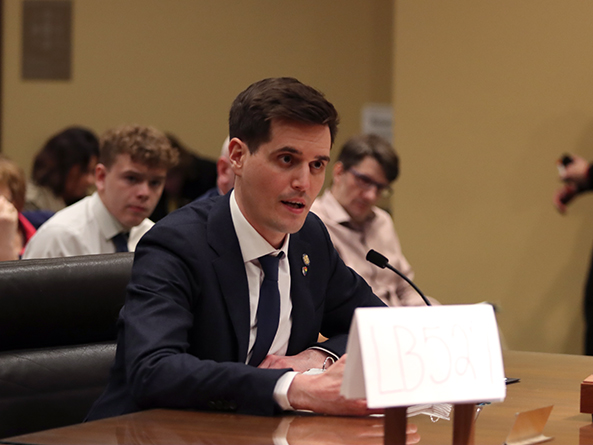Reimbursement for school mental health expenses proposed
The Education Committee heard testimony March 21 on a proposal intended to help meet the mental health needs of Nebraska public school students.

LB527, introduced by Omaha Sen. John Fredrickson, would require the state Department of Education to reimburse qualifying school districts and educational service units a percentage of their allowable mental health expenditures.
Fredrickson said 60 percent of the approximately 22,000 Nebraskans ages 12 to 17 who have depression did not receive treatment in the last year. The lack of mental health resources leads to poor academic performance, increased school absenteeism, substance abuse and behavioral problems, he said.
“Children eat, work and play at school,” Fredrickson said. “If we want to make a difference in the child’s life, we need early interventions within that environment.”
To qualify for reimbursement, school districts and ESUs would have to designate an employee as a community-based mental health resource liaison and provide the training and resources needed to help students, families, teachers and schools locate mental health resources.
Qualifying expenditures would be related to:
• the training or work of the liaison;
• meeting the mental health needs of an individual student or group of students; or
• a strategy to reduce students’ mental health needs by improving the overall educational environment.
LB527 states legislative intent to appropriate $12 million for reimbursements in fiscal year 2024-25.
Brandy Rose, a school psychologist at ESU 7, testified in support of the bill on behalf of the Nebraska State Education Association. She said schools and ESUs require more resources to meet the needs of an increasing number of students with mental and behavioral health problems.
In the districts she works with, Rose said, some teachers feel as if they have lost control of their classrooms as younger students become more physical and more students engage in disrespectful and defiant behavior linked to trauma and unmet mental health needs.
“By reducing mental health and behavioral challenges,” she said, “students will make more growth academically, peer relationships will be stronger, teacher retention will be higher and overall behavioral issues will be reduced.”
Stephen Grizzle, superintendent at Fairbury Public Schools, also testified in support. Since contracting with ESU 5 to provide mental health services to students and staff last year, he said, school absences, suspensions and classroom evacuations due to student disruptions have decreased.
“I cannot and will not claim that all of these improved stats are the direct result of the mental health supports, but it’s definitely been a positive influence that we can feel,” Grizzle said. “I know each district has its own priorities and needs, but if we could access financial support for these services, I believe more districts will try to offer them.”
Jordan Grieser, director of the Connections program at Project Harmony, testified in support of LB527 on behalf of Project Harmony and the Nebraska Alliance of Child Advocacy Centers. She said Connections received nearly 2,000 referrals last year for children in the Omaha metro area who needed mental health services.
Grieser said a 2021 statewide assessment found that one in four families found it difficult or impossible to access mental health services for their children on their own and that one in three paid for those services out-of-pocket.
“When we make high-quality, evidence-based mental health services available and easily accessible to the children who need it, they thrive,” she said. “This bill would give those who see children and families every day … the ability to actually link those children with the supports that they need.”
The committee took no immediate action on the bill.


